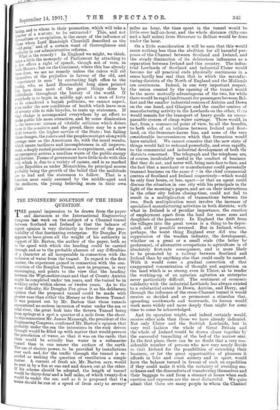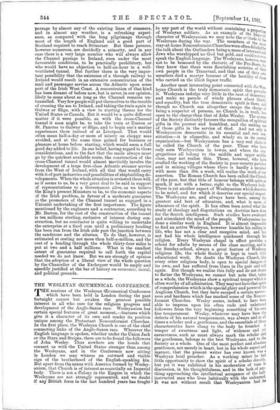THE ENGINEERS' SOLUTION OF THE IRISH QTJESTION.
-general impressicin to be drawn from the paper and discussion at the International Engineering Congress last. week - on the subject of 'a Channel tunnel between. Scotland and Ireland is that the balance of expert .opinion is very distinctly in favour of the prac- ticability of that faseinatingenterprise. Sir Douglas Fox appears to have given all the weight of his authority in support of Mr. Barton, the - author of the paper, both as to the speed with.. which the heading could be carried through and as to the probable absence of any difficulties of a character at all insuperable in connection with the exclusion of water from the.tenetel. In regard to the first matter, the experience gained in connection with the con- struction of the Simplon Tunnel, now in progress, is very encouraging, and points. to the view that the heading between- the Wigtonshire Coast and that of County Antrim tight be 'completed under: ten years,- and the tunnel be'iu working order within eleven or '-twelve -years: ": As t& the water difficulty, Sir Douglas Ilex gives it es -his. deliberate' opinion that the. proposed tunnel could be. made with greater ease than either the Mersey or the Severn Tunnel. - It was pointed out by Mr. Barton that those tunnels encountered no serious incursion of water under the sea or tidal river, the great -leak into the Severn Tunnel being from springs at a spot' a quarter of a -mile from the shore. hi this connection Mr. James Mansergh, the president of the Engineering Congress, confirmed Mr. Barton's opinion that probably under the sea the interstices in the rock driven through would be filled up with matter that would prevent the percolation of Water,- so that it was on the cards that there would be. actually less water in ar.- submarine tunnel that in one- nearer the surface of the earth.- The use of electric power, to -be provided by installations near each end, for the traffic through the tunnel is re, garded as making the question of ventilation a simple matter. A -current of fresh- air, Mr. Barton says, would be sent in by a fan. at one end and drawn out at the other. If his scheme should • be adopted, the length of tunnel would be thirty-fourand a half miles, of which twenty-fie e, would be under the sea, and as it is proposed that tie trains should be inn a speed of from sixty to seventy miles an hour, the time spent in the tunnel 'would be little over half-an-hour, and the whole distance (fifty-one and a half miles) from Stranraer to Belfast would be done under the hour. .
- On a little consideration it will be seen that, this would mean nothing less than the abolition for all harmful pur- poses of the Channel between Scotland and Ireland, and the steady diminution of its deleterious influences as a separation between Ireland and this country. The indus- trial Lowlands of Scotland and industrial Ulster weuld become for all practical ends physically continuous in a sense hardly less real than that in which. the manufac- turing districts of the North of England and the Midlands are continuous. Indeed, in one very important respect., the union created by the opening of the tunnel would be the more mutually advantageous of the two, for While there would be rapid landtransit for passengencbetween Bel- fast and the smaller industrial centres of Antrim and Down on the one hand, and Glasgow and. the smaller centres of manufacturing activity in the Lowlands on the other, there would remain for the transport of heavy goods an unsur- passable system of cheap water carriage. There would, in fact, from a commercial point of view, be all the benefits, to both sides, of an isthmus between Ireland and Scot- land, on the Stranraer-Larne line, and none of the. very considerable inconveniences which that formation would have entailed. We cannot conceive that the new state" of things would fail to redound. powerfully, and even rapid1j4 to the commercial and industrial development of both. the districts concerned. The telegraph and the telephone are; of course, incalculably useful in the conduct of business But they do not, and. never will, bring men face to face, and the fact that a merchant or manufacturer could personally transact business on the same d-y in the chief commercial centres of Scotland and Ireland respectively—which would be only four hours, or less, apart—or that an agent could discuss the situation in one city with his principals in the light of the morning's papers, and act on their instructions in the other city before closing-time, could not fail to result in a multiplication of transactions between the two. Such multiplication must involve the increase 'of specialised manufacturing activities in. both districts, with what in Ireland is of peculiar importance, the creation" of employment apart from the land for more sons and daughters of the peasantry. In England the drift from the villages into the great towns is a thing to- be depre- cated, and- if possib'c reversed. But in Ireland, where,' perhaps, the worst thing England ever did Was "the' suppression of the woollen industry, the development,- whether on - a great or a small scale (the latter by preference), of alternative occupatiens to agriculture is of absolutely first-rate consequence, and is more likely to be promoted by a railway' between Scotland. and Ireland than by anything else that could easily be named.. With it would come a gradual correction of - that exaggerated concentration of thought and aspiration on' the land which is so strong, even in 'Ulster, as to -render the working-up of an agrarian agitation an enterprise never particularly difficult. The sentiment of economic solidarity with the industrial Lowlands has always existed. to- a substantial eitent in Down, Antrim, and Derry, and through the influence of the cross-Channel tunnel it would receive so decided. and so permanent a stimulus that spreading southwards and. westwards, its leaveti would: work mere widely and more deeply than might for some" time to come be acknowledged.
And its operation might, and indeed certainly would,. receive other aids than those we have already. indicated, Not only Ulster and the Scottish Lowlands, but Th. very real fashion the whole of Great Britain and the. whole of Ireland would be drawn closer together by the successful tunnelling of the bed of the narrow seas:. In the first place, there can be no doubt that a very con- siderable number of persons who now very nearly decide to visit Ireland for the possibilities of extending their, business, or - for the great opportunities of pleasure it affords in lake and. coast scenery and in sport, would have the balance turned in favour of such an expedition if they could make it with the certainty of avoiding sea- sickness and the discomforts of transferring themselves and. their baggage to and from a steamer at hours when ouch eiertion and exposure are the most distasteful. We quite admit that there are many people to whom the Channel passage by almost any of the existing lines of steamers, and in almost any weather, is a refreshing experi- ence, as compared with the long pilgrimage through most of the length of England and a good part of Scotland required to reach Stranraer. But these persons, however numerous, are decidedly a minority, and in any case there is a very large number who will always allow the Channel passage to Ireland, even under the most favourable conditions, to be practically prohibitory, but who would have no objection to half-an-hour in a well- ventilated tunnel. But further there is the very impor- tant possibility that the existence of a through railway to Ireland would result in an extensive concentration of the mail and passenger service across the Atlantic upon some port of the Irish West Coast. A concentration of that kind has been dreamt of before now, but is never, in our opinion, likely to come about so long as the Channel remains =- tunnelled. Veryfew people will put themselves to the trouble of crossing the sea to Ireland, and taking the train wain to Galway or Sligo, with a view to starting thence for the United States or Canada. But it would be a quite different matter if it were possible, as with the cross-Channel tunnel it soon might be, to take the train at Euston or St. Pancras to Galway or Sligo, and to begin one's marine experiences there instead of at Liverpool. That would often mean half-a-day or more of misery on choppy seas avoided, and at the same time gained for business or pleasure at home before starting, which would. seem a full good day added to life. In our belief, having regard to these considerations, and to the fact that the mails always must go by the quickest available route, the construction of the cross-Channel tunnel would almost inevitably involve the development of a large first-class Atlantic steamer service from the West of Ireland, with all that that would carry with it of port industries and possibilities of shipbuilding de- velopments. When the whole situation is reviewed there will, as it seems to us, be a very great deal to be said in support of representations to a Government alive, as we believe the King's present Ministers to be, to the economic aspects of the Irish problem, in favour of a moderate guarantee in the promoters of the Channel tunnel as engaged in a Unionist undertaking of the first importance. The figure mentioned by the engineers and a contractor, according to Mr. Barton, for the cost of the construction of the tunnel is ten millions sterling, exclusive of interest during con- struction, but no contractor is quite will1 g to undertake the enterprise at a fixed sum until a preliminary heading lias been run from the Irish side past the junction between the sandstone and the silurian. To do that, however, is estimated at costing not more than half-a-million, and the cost of a heading through the whole thirty-four miles is put at two and a half millions. What is the smallest extent of guarantee required to call forth the capital needed we do not know. But we are strongly of opinion that the adoption of a liberal view of the whole question by the Chancellor of the Exchequer would be amply and speedily justified at the bar of history on economic, moral, and political grounds.







































 Previous page
Previous page